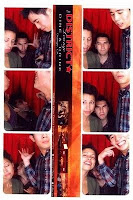
25 November 2009
24 November 2009
a sermon
In preparing for today, I was particularly struck my Jesus’ response to Pilate's question if he is king: “For this I was born, and for this I came into the world, to testify to the truth. Everyone who belongs to the truth listens to my voice."
From the get go, there are a couple of things that the word truth reminds me of. My first thought is usually that earlier passage in John where Jesus says he is the way, truth, and life. It's a verse I memorized in my childhood church (http://www.ghfc.org/).
My second thought is this Thich Nhat Hanh song I like to sing. The second verse goes:
Breathing in, breathing out
I am water reflecting what is real and what is true.
And I feel there is space deep inside of me
I am free.
I only heard of Thay last summer when I stayed at http://www.taize.fr/and then this past Christmas break I spent at http://www.deerparkmonastery.org/.
My third thought is my meditation group. It meets at the http://www.centerfortheworkingpoor.org/ in
As you might be able to tell, the word “truth” or “true” is complicated for me. The above references to truth have very different contexts. As I paused again to reflect on the readings for today and on how to incorporate in my farm life, I think Ive been able to break it down even a bit further. I came to the conclusion that the meaning of the word truth has changed even more since I’ve become a “farmer.”
Last year I was a CSU, Long Beach English Instructor and Chaplain, and at least in the world of academia, "truth" is something objective and is grounded in tradition. A conversation from an academic point of view meant persuading through rhetoric using Aristotle's Ethos, Pathos, Logos toward a TELOS, or end. This is what I taught in English 100. I used my head mostly and saw life as a ladder to climb from lowly adjunct instructor toward being more "king like" -- the top, the head, tenured professor, leader, etc. My sense was that we are climbing toward truth and helping others to climb as well.
However, now I a "farmer" and truth is so much more physical and embodied. Conversation is about sharing our experiences and coming to an understanding of the truth in each of our lives through relationship. The end goal is the process of understanding. In my farm life world, I use my head so much less and instead, I use my hands, my body, and my heart more now. Life seems much more weblike and is about interconnectedness, empathy, understanding, love.
Moreso, Jesus' words reminds me of
Jesus appears to be just that and refuses to become a part of the oppressive muddle that would call him King or crucified. It's about something more I hear him say.
21 November 2009
Running on lawns
11 November 2009
Don't wake me; I'm where the wild things are
04 November 2009
The difference between the two ways of seeing is the difference between walking with and without a camera. When I walk with a camera I walk from shot to shot, reading the light on a calibrated meter. When I walk without a camera, my own shutter opens, and the moment’s light prints on my own silver gut. When I see this second way I am above all an unscrupulous observer.
Do I substitute the photographs for the real deal? The virtual relationship for the intimate one? Am I doing it with this blog?
Found a cool blog today . http://tiakramer.blogspot.com/2007/11/contextualized-language.html. with Annie Dillard quotations on random items.

"risking sticking my face in"
Seems appropriate for this post.











